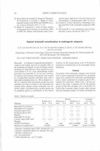 2 citations,
February 2021 in “The Journal of clinical and aesthetic dermatology”
2 citations,
February 2021 in “The Journal of clinical and aesthetic dermatology” Understanding the cause of bitemporal hair loss is key to deciding the right treatment.
 2 citations,
February 2022 in “Frontiers in Endocrinology”
2 citations,
February 2022 in “Frontiers in Endocrinology” Antiandrogenic pretreatment for women with PCOS does not improve fertility outcomes and delays pregnancy.
 2 citations,
January 2019 in “Indian Dermatology Online Journal”
2 citations,
January 2019 in “Indian Dermatology Online Journal” The congress concluded that misuse of antifungal drugs in South Asia has led to widespread treatment failure, and new approaches and regional cooperation are needed.
[object Object] 1 citations,
April 2021 in “Journal of Cosmetic Dermatology” The cream effectively reduced hair growth on forearms.
 November 2024 in “Dermatitis”
November 2024 in “Dermatitis” Men's personal care products often cause allergic skin reactions.
April 2024 in “International journal of molecular sciences” Light-based treatment, Photobiomodulation, shows promise for non-invasive skin therapy with few side effects.
 January 2024 in “Journal of Tissue Engineering”
January 2024 in “Journal of Tissue Engineering” A new ethical skin model using stem cells offers a reliable alternative for dermatological research.
 December 2024 in “Frontiers in Genetics”
December 2024 in “Frontiers in Genetics” EGFR and mTOR inhibitors may help manage Olmsted syndrome symptoms.
 April 2022 in “Anti-cancer agents in medicinal chemistry”
April 2022 in “Anti-cancer agents in medicinal chemistry” Some existing medicines show promise as safe treatments to protect against the side effects of radiation therapy.
 9 citations,
April 2016 in “Australasian journal of dermatology”
9 citations,
April 2016 in “Australasian journal of dermatology” Combining imiquimod with diphenylcyclopropenone may improve treatment outcomes for alopecia areata patients who don't respond to diphenylcyclopropenone alone.
 17 citations,
July 1994 in “Journal of Dermatological Science”
17 citations,
July 1994 in “Journal of Dermatological Science” The cause of alopecia areata is likely a mix of genetics, immune system issues, and environmental factors, with more research needed to understand it fully.
 14 citations,
January 2014 in “Journal of Cutaneous and Aesthetic Surgery”
14 citations,
January 2014 in “Journal of Cutaneous and Aesthetic Surgery” Scalp Roller therapy helped improve hair growth in patients with hard-to-treat alopecia areata.
 14 citations,
July 1987 in “Contact Dermatitis”
14 citations,
July 1987 in “Contact Dermatitis” A small percentage of minoxidil users may develop an allergic skin reaction.
 17 citations,
November 2002 in “Australasian Journal of Dermatology”
17 citations,
November 2002 in “Australasian Journal of Dermatology” Saw palmetto causes allergic reaction, minoxidil causes skin irritation; use cautiously for hair loss.
 7 citations,
January 2021 in “Cureus”
7 citations,
January 2021 in “Cureus” A woman had an allergic skin reaction to a hair loss treatment containing minoxidil and should not use it.

Any medication can cause skin reactions, some due to allergies and others due to dosage or genetic factors.
11 citations,
June 2018 in “Annales de dermatologie et de vénéréologie” Hair care products can cause skin irritation and allergies.
 5 citations,
July 2003 in “Drug Development Research”
5 citations,
July 2003 in “Drug Development Research” Fluridil promotes hair growth safely and effectively for androgenetic alopecia.
 56 citations,
August 1981 in “Journal of The American Academy of Dermatology”
56 citations,
August 1981 in “Journal of The American Academy of Dermatology” Minoxidil helps hair regrowth in alopecia areata safely.
 41 citations,
November 1993 in “Journal of The American Academy of Dermatology”
41 citations,
November 1993 in “Journal of The American Academy of Dermatology” DPCP helps treat severe hair loss, but 5% minoxidil doesn't add benefits.
 9 citations,
July 2020 in “Experimental Dermatology”
9 citations,
July 2020 in “Experimental Dermatology” Topical L-thyroxine may help with wound healing and hair growth but should be used short-term due to potential risks.
 9 citations,
July 2017 in “Dermatologic Therapy”
9 citations,
July 2017 in “Dermatologic Therapy” Two elderly men developed scalp inflammation after using a gel for skin lesions, which healed with treatment except for some permanent hair loss.
 8 citations,
April 2020 in “Journal of The American Academy of Dermatology”
8 citations,
April 2020 in “Journal of The American Academy of Dermatology” Oral minoxidil is a reasonably safe alternative for patients allergic to the topical form.
 3 citations,
April 2016 in “Journal of The American Academy of Dermatology”
3 citations,
April 2016 in “Journal of The American Academy of Dermatology” A woman had a severe skin reaction from the drug imiquimod, used for skin cancer, highlighting the need for awareness of rare but serious side effects.

Topical calcipotriol successfully treated hair loss in three patients with Alopecia Totalis.
 8 citations,
September 2017 in “Journal of Natural Medicines”
8 citations,
September 2017 in “Journal of Natural Medicines” Applying an extract from Perilla frutescens helps hair grow and fights the effects of hair loss hormones.
 January 2011 in “Side effects of drugs annual”
January 2011 in “Side effects of drugs annual” Tretinoin gel is safe for sun exposure, but tacalcitol doesn't significantly improve non-segmental vitiligo.
15 citations,
March 2008 in “The Journal of Dermatology” Topical squaric acid dibutylester worsened discoid lupus erythematosus in a patient.
53 citations,
October 1998 in “The journal of investigative dermatology/Journal of investigative dermatology” Topical calcitriol-analogs can reduce hair loss caused by chemotherapy.
[object Object]  4 citations,
September 2014 in “Elsevier eBooks”
4 citations,
September 2014 in “Elsevier eBooks” Use some skin medications with caution during pregnancy; avoid strong steroids, certain eczema treatments, and systemic retinoids, but many topical treatments and nasal sprays are safe.

























